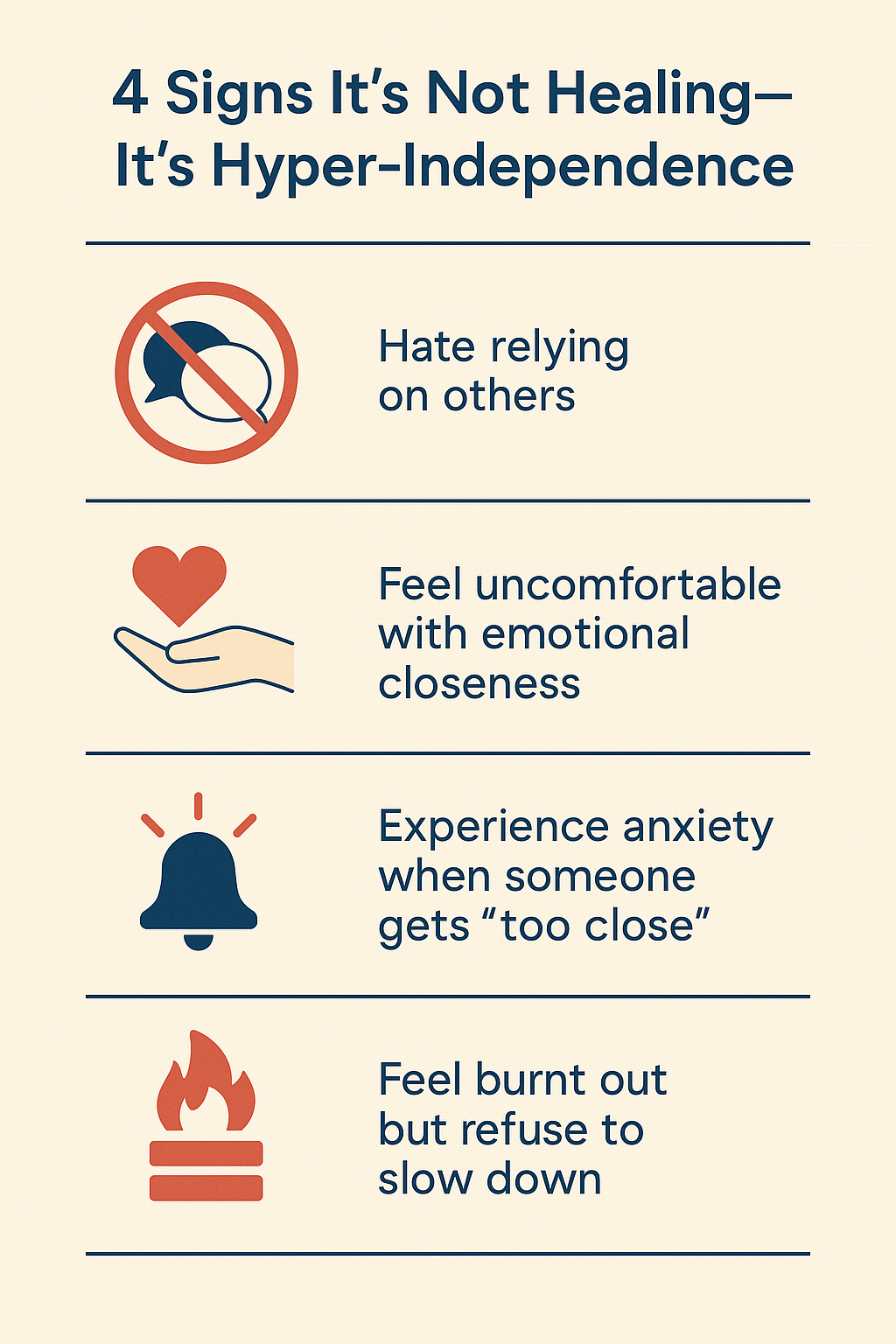Is It Healing or Hyper-Independence? When “I Got It” Becomes “I Don’t Need Anyone”
The Rise of the “I Don’t Need Anyone” Era
You handle everything yourself.
You solve your own problems.
You don’t ask for help, even when you’re drowning.
You take pride in being strong, capable, untouchable.
On the surface, it looks like healing — like finally becoming the self-sufficient, resilient version of yourself you’ve always wanted to be.
But underneath?
You might be exhausted.
You might feel alone.
You might be craving support you won’t let yourself receive.
This is hyper-independence — the point where “I got it” quietly turns into “I don’t trust anyone else to help me.”
And in King West, where high-performing, image-driven, emotionally polished adults thrive, hyper-independence gets praised — even when it’s hurting you.

1. What Is Hyper-Independence, Really?
Hyper-independence is not just being capable.
It’s being unable to lean on others, even when you need to.
It often sounds like:
- “I don’t want to be a burden.”
- “No one ever shows up anyway.”
- “Depending on people is risky.”
- “I’m better off alone.”
- “I don’t have time for drama.”
- “I can handle it.” (while silently breaking)
Hyper-independence is not confidence —
it’s self-protection disguised as strength.
2. Why Hyper-Independence Is Often a Trauma Response
When we grow up with:
- Unreliable caregiving
- Emotional neglect
- Chaos or instability
- Being forced to mature early
- Taking care of others instead of being cared for
- Repeated disappointment or abandonment
We learn a painful rule:
“If I don’t rely on anyone, no one can hurt me.”
That rule may have kept you safe then.
But now?
It isolates you.
Therapy helps you rewrite that rule.
3. The Difference Between Healing & Hyper-Independence
Healing
✓ Setting boundaries
✓ Knowing your needs
✓ Asking for support
✓ Allowing closeness
✓ Practicing interdependence
✓ Feeling safe in connection
.png)
Hyper-Independence
✗ Over-functioning
✗ Not expressing needs
✗ Avoiding vulnerability
✗ Distrusting closeness
✗ Feeling guilty for resting
✗ Feeling alone even when surrounded by people
Hyper-independence often masquerades as empowerment — but it’s actually avoidance dressed in designer self-care.
4. Signs You’re Hyper-Independent (Not Healed)
You might be hyper-independent if you:
- Hate relying on others
- Struggle to accept help
- Feel uncomfortable with emotional closeness
- Assume people will disappoint you
- Feel safer doing everything yourself
- Experience anxiety when someone gets “too close”
- Keep your emotions private, always
- Lose interest when someone treats you well
- Feel burnt out but refuse to slow down
This isn’t “being strong.”
This is being tired of being forced to be strong.
5. Why Hyper-Independence Thrives in King West
King West is full of:
- High achievers
- Creatives
- Entrepreneurs
- Professionals with big goals
- People who look like they've got it all together
In this environment, emotional self-sufficiency becomes part of the identity — the silent badge of honour.
But secretly?
Many people here feel:
- Disconnected
- Overworked
- Overly responsible
- Emotionally guarded
- Afraid to be “too much”
Hyper-independence thrives where vulnerability feels like weakness.
.png)
6. The Relationship Impact: You Push People Away Without Realizing It
Hyper-independence can create emotional distance in relationships.
You might:
- Avoid deep conversations
- Pull away when someone gets close
- Choose partners who don’t show up emotionally
- Over-accommodate others but never share your own needs
- End relationships before they have a chance to deepen
- Feel undeserving of care
People may see you as low-maintenance
…but inside, you’re starving for care you won’t allow yourself to receive.
7. The Burnout Behind “Being the Strong One”
Hyper-independence often leads to:
- Emotional exhaustion
- Anxiety
- Sleeplessness
- Resentment
- Stress overload
- Feeling unseen in your relationships
- Identity built around competence, not connection
When your entire personality becomes “I got it,”
you lose the chance to be fully human.
8. How Therapy Helps You Build Healthy Interdependence
At KMA Therapy’s King West location, we work with people who appear confident, composed, and capable — but feel alone carrying everything on their own.
Therapy can help you:
- Understand the roots of your hyper-independence
- Build emotional safety in closeness
- Learn to ask for help without guilt
- Set boundaries that don’t isolate you
- Rewire beliefs around trust and vulnerability
- Develop interdependent, secure relationships
- Learn how to let people in
- Reduce burnout from over-functioning
You’re not meant to handle life alone — even if you can.
9. You Don’t Have to Earn Connection
You don’t need to “deserve” support.
You don’t need to carry everything by yourself.
You don’t need to be invincible to be worthy of love.
Healing often begins in the moment you whisper:
“I’m tired.”
And someone replies,
“You don’t have to do this alone.”
.png)
Ready to Let Someone In?
If you’re done carrying the world on your shoulders, our King West therapists can help you gently shift from hyper-independence to healthy connection.
Book your 15-minute discovery call today to get matched with a therapist who understands what it means to be strong — and still need support.
👉 Book your free 15-minute discovery call →






